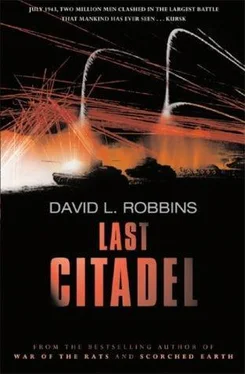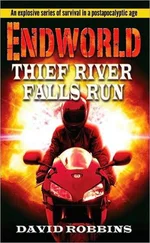‘Turn them around,’ he directed the sergeant. The soldier obeyed.
Luis barely looked at them. He’d had more curiosity for the dead ones lined along the rail mound, the ones who died fighting. These three surrendered.
Luis dispatched the first one. The single shot to the back of the head pitched the partisan forward. The report flew off into the fathomless night. The partisan crumpled across the tracks. One of the grenadiers hauled the body back by the feet, aligning it tidily with the rest of the corpses.
The second partisan whimpered. Luis stepped back and shot him from an outstretched arm, to put as much distance between himself and this weeper as he could. This one did not even tumble forward but collapsed at the knees, so weak was he. Another soldier straightened the body.
Luis walked behind the third. He raised his pistol. The man turned around to face him, not lifting his eyes to the Luger aimed at his forehead but glaring deep into Luis’s sockets. Luis saw a sneer; the partisan was enjoying what had been done to this SS man he now eyed, the flesh stripped off him by the war made on Russia. The partisan licked his lips, dry, under clean-shaven cheeks. He was old, this one, he’d seen enough life, time to balance it out with death. He challenged Luis by turning around. He mocked him by speaking.
‘ Rodina ,’ the partisan said.
Luis felt alone with the partisan, enfolded by night out here on a stretch of Russian rail. The man had said ‘Motherland.’ His eyes were final, not just for himself but for Luis and the whole war. Luis held the gun steady between the partisan’s eyes.
Slowly, with even more sureness than the partisan had mustered, he shook his own head. No, he told the man with the gesture; the finalness is yours alone.
He lowered the gun, handing it back to the sergeant. No one else moved, not the major nor any of the watching grenadiers.
In a flash, Luis grabbed the hilt of his SS knife. The blade leaped from its sheath. With a backhand stab, knuckles up, Luis drove the dagger into the side of the partisan’s neck. The knife embedded where it was intended, missing the carotid artery and striking between the vertebrae to slice the spinal cord. Luis yanked the blade out and the partisan fell like a puppet with its strings cut. The glare on the man’s face was wiped away.
Luis looked to the sky. The sun was beginning to rise. He knelt to swipe his knife on the partisan’s pant leg, then slid the blade back into its scabbard.
He issued no orders for the soldiers to follow, but walked away past the line of bodies, toward the waiting train. The men tramped after him, wordless, rifles clanking in their arms and across their backs. He didn’t look down at the partisans, there was no more curiosity, death made every man the same.
Major Grimm caught up to him at the head of the company. Luis still felt the life of the defiant partisan throb in his hand, a powerful sensation, like a heartbeat. The major wanted to talk, it seemed, but Luis did not oblige. He reached into a pocket for a packet of crackers to appease his hunger.
July 2
0210 hours
west of Tomarovka
Even half conscious, Katya could still ride.
The three dark partisans who’d cut her from her downed U-2 had horses tied at the nearby farm of a peasant. Four mounts waited, the spare was to have been for Leonid.
She needed help climbing into the saddle. Her ribs and hips all felt clobbered, every muscle seared. The old peasant looked her over while handing a bag of food up to one of the partisans. He asked, ‘Is this the pilot you came to rescue? A woman?’ The partisan took the parcel and replied, ‘No.’
One of the men grabbed the reins to guide her horse. Katya drew the leather back into her own hands and told him, ‘Ride.’
The three partisans wheeled their mounts. The peasant continued his distasteful glare at Katya, as though he’d risked his life stashing these horses for the partisans to salvage nothing more than some fragile female. She managed one good kick in her horse’s ribs and lit out behind them into the darkness.
They rode for an hour, stopping at every sound in the night. The horses were well trained, accustomed to stealth, they did not nicker or stomp. The three men did not talk to Katya, they seemed angry with her. She did not ask questions. She was in a new slipstream, swept off in the current of unexpected events and people. She clung to the horse by instinct, for her hands and knees could barely clutch. Her mind staggered between blows: in one moment pain, in the next dead Vera left behind, in another Leonid lost or captured, then fear, then again pain.
One of the partisans was the leader of their little group. He rode in front and set the tone and pace. They stayed out of the open fields and away from every building, creeping along the gaps between tree lines. The Germans in this area kept themselves murky, only a few distant campfires were spangles on the darkness, one set of headlights on a far-off dirt road glimmered and vanished. The four riders came to a stream. The leader raised a hand for them to stop. He dismounted and waved the others from their horses. Leading his horse, he moved into the calf-deep water. Katya swung her leg across the saddle. She heard herself moan, the ground became the sky, galaxy-filled. She fainted.
July 2
Noon
in a field south of Borisovka
Rain dribbled on her forehead. Soft light played over her eyelids. The grass beneath her back felt soft and damp. Papa knelt beside her – was it Papa? – smelling of horse and steel, and close too was the youth of Valentin, an energy she could feel without seeing. A horse pawed, a leafy branch strayed between her shut eyes and the sky. She was home.
Katya opened her eyes. Gray light dodged through wet branches low over her face. She blinked, and that movement tripped off the pain in her joints. She groaned and turned her head.
‘So, this is a Night Witch.’
The voice tumbled from a squatting man, his elbows across his knees and his boot heels off the grass. His voice was deep, but no deeper than the eyes which were set in his sockets as if at the back of caves. They were black eyes under black brows, over hollow grim cheeks fletched with silver stubble. But he smiled and reached down a hand. Each finger was filthy with half-moons of dirt under the nails. He wore a charcoal wool suit coat and brown slacks. His shirt was forest green.
Katya took a deep breath; her ribs protested, making her wince. The squatting man shook the hand he held out. Katya took it. He pulled gently and she sat up.
‘There,’ he said. ‘All better, yes?’
‘No.’
She looked about. In addition to this stranger, thirty others sat oiling guns, eyeing the surrounding fields through the dripping leaves, or napping. An equal number of horses clustered around the trees where they were tethered.
‘Where am I?’
‘Three miles south of Borisovka. In a stand of trees. On your ass, where you’ve been for the last nine hours.’
Katya remembered stopping at the stream. Swinging her leg out of the saddle. The burst of stars.
‘I…’
‘You passed out. They brought you in across your saddle.’ The man pointed at three men standing behind him. ‘You’re a sound sleeper, Night Witch. What’s your name?’
The three came to loom over the kneeling partisan. She recognized them through the haze of her recollection; last night’s leader was an old one very like the man beside her, hardened, something vicious under the skin. The other two were younger, probably soldiers found behind enemy lines. One was thin, the other heavy. The skinny one was cold-eyed, not much more than twenty yet he looked wicked, a killer. The heavy one might have been her age, twenty-eight, with a blushed, full face like a red rising sun. This one’s manner was mercurial, with fleet eyes and a nervous, jiggling neck. Katya knew either of them, any of them gathered under these trees, would stick a dirk in her heart if they believed she was a threat to their unit.
Читать дальше












